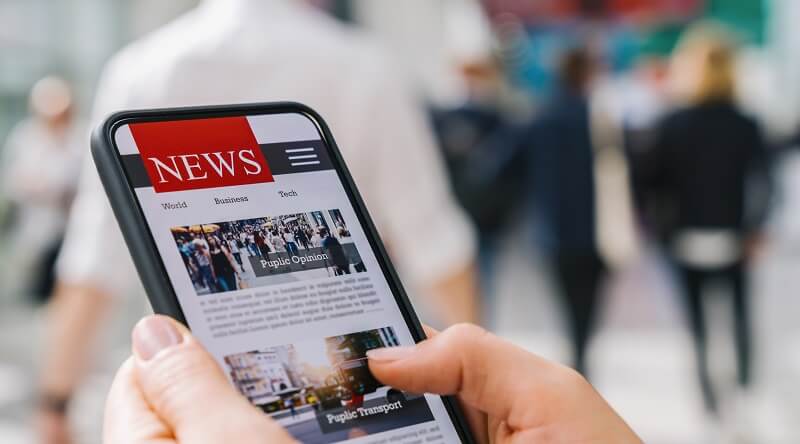The Value of Fact-Checking in the World of News Online
The prevalence of misinformation in today's on the internet news landscape has actually gotten to alarming levels. Fact-checking organizations play a crucial duty in counteracting this pattern. They verify insurance claims and boost the reliability of journalism. Nonetheless, the performance of these companies often rests on their methodologies and public assumption. As audiences navigate this complicated setting, the effects of their searchings for may shape the future of news usage and trust fund. What does this mean for the honesty of info moving on?

The Increase of Misinformation in the Digital Age
Just how has the advent of electronic innovation contributed to the spread of false information? The fast development of the web and social media sites systems has promoted the dissemination of info at an extraordinary speed. Individuals can share articles, video clips, and point of views with a mere click, commonly without verifying the material's precision. Algorithms prioritize spectacular or psychologically charged product, resulting in a proliferation of deceptive stories that catch attention.
Additionally, the anonymity afforded by digital systems permits individuals to spread out false info without accountability (stnews.live). False information grows in resemble chambers, where individuals are revealed primarily to viewpoints that strengthen their ideas, even more setting frauds. The saturation of information can overwhelm individuals, making it challenging to recognize trustworthy sources from undependable ones. Misinformation has actually ended up being a pervasive problem in the electronic landscape, affecting public viewpoint and trust fund in legit news resources.
The Duty of Fact-Checking Organizations
Fact-checking organizations play a vital duty in enhancing the integrity of journalism by verifying cases made in news records. Their efforts are vital in combating false information, guaranteeing that accurate information prevails in the digital landscape. By holding media electrical outlets accountable, these companies add significantly to notified public discourse.
Enhancing Reliability in Journalism
While false information multiplies in the electronic age, fact-checking organizations play a vital function in enhancing the reliability of journalism. These organizations meticulously validate insurance claims made in newspaper article, public declarations, and social networks messages, ensuring that details distributed to the general public is precise and trustworthy. By giving independent evaluations, they serve as an important source for journalists, aiding them preserve high standards of stability. In addition, their initiatives promote openness in media, promoting public count on. As target markets become increasingly discerning, the presence of reliable fact-checking entities can differentiate reputable news sources from those that may spread out fallacies. Eventually, the commitment of fact-checking organizations to promote reliability is crucial for the wellness of autonomous discussion.
Combating Misinformation Effectively
As false information continues to spread rapidly throughout digital platforms, the duty of fact-checking companies ends up being significantly vital in the battle for accurate information. These organizations offer as watchdogs, inspecting claims made by somebodies and media electrical outlets to assure accountability. By using extensive research study techniques and expert evaluation, they confirm truths and clarify misleading narratives. Their searchings for are shared through various networks, informing the public and fostering essential reasoning. On top of that, collaborations with social networks systems improve their reach, permitting for punctual flagging of false details. As electronic literacy expands, the influence of fact-checking organizations is essential in equipping audiences to determine reality from fraud, eventually adding to an extra enlightened culture.
Just How Misinformation Affects Public Understanding
False information considerably undermines count on media, leading target markets to doubt the credibility of news resources. Therefore, people commonly gravitate in the direction of electrical outlets that enhance their current beliefs, adding to the polarization of point of views. This vibrant produces a fragmented information landscape, where shared comprehending ends up being progressively tough to accomplish.
Count on Media

Count on media has actually become progressively delicate in the digital age, where the rapid spread of false details can alter public understanding. As misinformation proliferates throughout social networks and on the internet systems, audiences typically discover it testing to discern qualified resources from unstable ones. This uncertainty promotes uncertainty, leading numerous people to question the objectives behind news reporting. Consequently, count on established media outlets has lessened, as consumers significantly turn to alternate sources that might lack extensive editorial criteria. This erosion of trust not only influences specific beliefs however additionally undermines the cumulative capacity to take part in educated discussions. Inevitably, the integrity of journalism goes to stake, highlighting the vital demand for effective fact-checking to restore self-confidence in the media landscape.

Polarization of Opinions
The increasing uncertainty towards standard media has added to an expanding polarization of opinions among the general public. False information, often disseminated through social networks and on the internet systems, plays a substantial duty in shaping distinctive ideological divides. Individuals frequently seek out information that aligns with their pre-existing ideas, strengthening their point of views while disregarding opposing point of views. This echo chamber effect magnifies divisions, causing a fragmented public discussion where consensus becomes increasingly evasive. In addition, sensationalized stories prosper in this atmosphere, further skewing public perception and promoting suspect in reliable resources. helpful resources As polarization rises, the need for reliable fact-checking ends up being paramount to link spaces and promote educated discussions, eventually making sure a much more natural culture capable of navigating complex issues.
Strategies for Reliable Fact-Checking
Reliable fact-checking relies on an organized strategy that includes detailed research study, verification of sources, and important evaluation of insurance claims. A foundational method is cross-referencing information from several reputable resources to verify its precision. Fact-checkers usually utilize specialized data sources and archives to trace the beginning of specific declarations, ensuring that the reported info straightens with recorded evidence.
One more important technique includes inspecting the context in which insurance claims exist. Misleading details can develop from out-of-context quotes or careful data usage. By examining the wider story, fact-checkers can determine possible prejudices or false impressions.
Furthermore, engaging with specialists in relevant areas can provide clearness and understanding that boosts the fact-checking process. This cooperation can reveal nuances that laypeople might neglect - stnews.live. Ultimately, a self-displined approach combining these strategies promotes a much more educated public, enhancing the reliability of info distributed in the digital age
The Effect of Social Media Site on News Usage
How has social media sites transformed the method people consume news? The appearance of platforms like Facebook, Twitter, and Instagram has notably modified news consumption patterns. News is now disseminated quickly, allowing individuals to access real-time updates and involve with content via likes, shares, and comments. This immediacy has actually cultivated a preference for bite-sized info, usually at the cost of thorough evaluation.
Social media enables personalized news feeds, where formulas curate web content based on individual preferences, producing echo chambers that might limit direct exposure to diverse viewpoints. The duty of conventional news electrical outlets has actually lessened as individuals progressively rely upon peer referrals and trending topics. The credibility of info is commonly jeopardized, as sensationalism can outweigh factual coverage. In general, social media sites has actually improved news usage, emphasizing rate and customization while challenging the requirements of journalistic integrity.
Encouraging Target Markets to Identify Trusted Sources

In addition, examining the authorship and organizational background of newspaper article can expose possible prejudices. Cross-referencing details throughout multiple reputable outlets better improves the confirmation procedure. Making use of electronic tools, such as internet browser expansions that rank the reliability of web sites, can also assist in determining reliable information. By actively involving with these sources and cultivating an essential way of thinking, audiences can better equip themselves to recognize trusted news sources, ultimately promoting an extra educated culture amidst the complexities these days's media setting.
The Future of Journalism and Fact-Checking
As the media landscape evolves, the future of journalism and fact-checking encounters both tests and opportunities. The rise of digital systems has equalized details circulation, allowing varied voices to emerge. This has actually also led to the spreading of misinformation, demanding robust fact-checking mechanisms. Journalists will increasingly depend on innovation, including AI tools, to verify facts rapidly and effectively.
Collaboration in between wire service and fact-checking entities is prepared for to enhance trustworthiness and openness. Target market involvement will play an important duty, as educated readers become significant partners in recognizing credible web content.
The need for see accountability and precision is likely to grow, pressing journalists to maintain high standards in their reporting. Eventually, the future of journalism might rest on its capacity to adjust to technological innovations while maintaining journalistic integrity, making certain that fact-checking remains a cornerstone of credible news.
Frequently Asked Concerns
How Can I Report Misinformation I Experience Online?
To report misinformation experienced online, people can use platform-specific reporting tools, supply clear evidence, and share the information with fact-checking companies. Engaging with neighborhood discussions can additionally help elevate recognition about the false information.
What Are Usual Indications of Misinformation in News Articles?
Usual signs of misinformation in news short articles consist of marvelous headings, absence of credible resources, emotional language, inconsistent truths, and absence of writer credentials. Readers need to seriously examine content for these indications to recognize precision.
How Do Fact-Checkers Confirm Resources?
Fact-checkers verify sources by cross-referencing information with credible databases, getting in touch with specialists, and taking a look at the original check this context of insurance claims. They additionally examine the dependability of the sources, guaranteeing precise and reliable details for public consumption.
What Lawful Activities Can Be Taken Versus False information?
Lawful actions versus false information might consist of disparagement claims, cease-and-desist orders, and governing penalties. Targets can seek remedy with civil courts, while some jurisdictions impose fines or permissions on systems sharing incorrect details.
Exist Apps for Fact-Checking News On-The-Go?
Countless applications exist for fact-checking news on-the-go, consisting of Snopes, FactCheck.org, and PolitiFact. These applications assist individuals validate insurance claims promptly, advertising informed decision-making and promoting a much more discerning technique to consuming news in real-time.